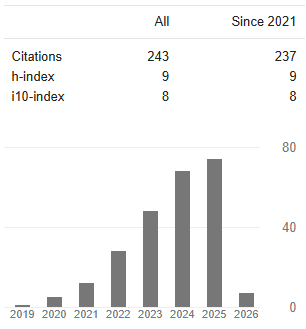Performance Analysis of a Low Head Water Vortex Turbine
DOI:
https://doi.org/10.47981/j.mijst.09(02)2021.297(31-36)Keywords:
Water vortex turbine, Micro hydro power, Renewable energyAbstract
A small hydropower plant is an environment-friendly renewable energy technology. The run-of-river type gravitational water vortex turbine can be designed to produce electricity at sites with low water heads. In this study, an experimental investigation was undertaken on this type of turbine with a water tank and a runner which is connected to a shaft. At the end of the shaft, a rope brake was attached to measure the output power, torque and overall efficiency of the vortex turbine by varying flow rates. The designed vortex turbine can achieve an overall efficiency of . The experimental results were validated with available data in the literature and theories associated with the turbine. The results also showed that the flow rate plays a vital role in generating power, torque as well as overall efficiency. The project was completed using local resources and technologies. Moreover, as water is used as the input power, this project is eco-friendly which has no adverse effect on the environment.
Downloads
References
Alwan, H., & Al-Mohammed, F. (2018). Discharge coefficient for rectangular notch using a dimensional analysis technique. IOP Conference Series: Materials Science And Engineering, 433, 012015. https://doi.org/10.1088/1757-899x/433/1/012015
Bajracharya, T. R., Shakya, S. R., Timilsina, A. B., Dhakal, J., Neupane, S., Gautam, A., & Sapkota, A. (2020). Effects of Geometrical Parameters in Gravitational Water Vortex Turbines with Conical Basin. Journal of Renewable Energy, 2020(Figure 1), 1–16. https://doi.org/10.1155/2020/5373784
Bernitsas, M. M., Raghavan, K., Ben-Simon, Y., & Garcia, E. M. (2006). VIVACE (Vortex induced vibration aquatic clean energy): A new concept in generation of clean and renewable energy from fluid flow. Volume 2: Ocean Engineering and Polar and Arctic Sciences and Technology, 2. https://doi.org/10.1115/omae2006-92645
Butera, I., & Balestra, R. (2015). Estimation of the hydropower potential of irrigation networks. Renewable And Sustainable Energy Reviews, 48, 140-151. https://doi.org/10.1016/j.rser.2015.03.046
Çengel, Y., & Cimbala, J. Fluid mechanics (3rd ed., p. 971). McGraw-Hill Education.
Graebel, W. (2007). Advanced fluid mechanics (1st ed., p. 368). Academic Press.
GUPTA, H. N. (2012). Fundamentals of internal combustion engines (2nd ed.). PHI Learning Pvt.
Dhakal, R., Bajracharya, T., Shakya, S., Kumal, B., Khanal, K., & Williamson, S. et al. (2017). Notice of Violation of IEEE Publication Principles: Computational and experimental investigation of runner for gravitational water vortex power plant. 2017 IEEE 6Th International Conference On Renewable Energy Research And Applications (ICRERA), 9. https://doi.org/10.1109/icrera.2017.8191087
Ersoy, S. (2014). Vortex with the Formation of Electricity Generation and System Modelling. International Journal Of Environmental Science And Development, 5(468), 152-154. https://doi.org/10.7763/ijesd.2014.v5.468
Huda, L. (2011). A study on the effect of dimensional oscillating part of vortex power plant using physical test [Master's thesis]. Department of Ocean Engineering Faculty of Marine Technology Institute Technology of Sepuluh.
Kaldellis, J. (2007). The contribution of small hydro power stations to the electricity generation in Greece: Technical and economic considerations. Energy Policy, 35(4), 2187-2196. https://doi.org/10.1016/j.enpol.2006.06.021
Khurmi, R. (1987). Textbook of Hydraulics, Fluid Mechanics and Hydraulic Machines (15th ed., p. 990). S Chand & Co.
Permana, D. W. (2011). Study effect of free surface on the oscillating part concerning to the performance lies vortex power: physical test phenomenological [Master's thesis]. Department of Ocean Engineering Faculty of Marine Technology Institute Technology of Sepuluh.
Rahman, M. M., Hong, T. J., & Tamiri, F. M. (2018). Effects of inlet flow rate and penstock’s geometry on the performance of Gravitational Water Vortex Power Plant. Proceedings of the International Conference on Industrial Engineering and Operations Management, 2018-March, 2968–2976
Razan, J., Islam, R., Hasan, R., Hasan, S., & Islam, F. (2012). A Comprehensive Study of Micro-Hydropower Plant and Its Potential in Bangladesh. ISRN Renewable Energy, 2012, 1-10. https://doi.org/10.5402/2012/635396
Saleem, A. S., Cheema, T. A., Ullah, R., Ahmad, S. M., Chattha, J. A., Akbar, B., & Park, C. W. (2020). Parametric study of single-stage gravitational water vortex turbine with cylindrical basin. Energy, 200, 117464. https://doi.org/10.1016/j.energy.2020.117464
Singh, P., & Nestmann, F. (2009). Experimental optimization of a free vortex propeller runner for micro hydro application. Experimental Thermal and Fluid Science, 33(6), 991-1002. https://doi.org/10.1016/j.expthermflusci.2009.04.007
Sritram, P., & Suntivarakorn, R. (2017). Comparative study of small hydropower turbine efficiency at low head water. Energy Procedia, 138,646-650. https://doi.org/10.1016/j.egypro.2017.10.181
Ullah, R., Cheema, T. A., Saleem, A. S., Ahmad, S. M., Chattha, J. A., & Park, C. W. (2020). Preliminary experimental study on multi-stage gravitational water vortex turbine in a conical basin. Renewable Energy, 145, 2516–2529. https://doi.org/10.1016/j.renene.2019.07.128
White, F. (2011). Fluid mechanics (7th ed., p. 863). McGraw-Hill Education (India) Private Limited.
Yamaguchi, H. (2008). Engineering fluid mechanics (1st ed.). Springer.
Zotlöterer, F. (2011). Hydroelectric power plant. Germany. Patent No WO 2011051421A2.
Downloads
Published
Issue
Section
License
Copyright (c) 2021 MIST INTERNATIONAL JOURNAL OF SCIENCE AND TECHNOLOGY

This work is licensed under a Creative Commons Attribution-NonCommercial 4.0 International License.
MIJST follows the open access policy.

This work is licensed under a Creative Commons Attribution-NonCommercial 4.0 International License. This allows anyone to copy, share, distribute, and modify the work for non-commercial purposes, where the original work and source should be properly credited.














